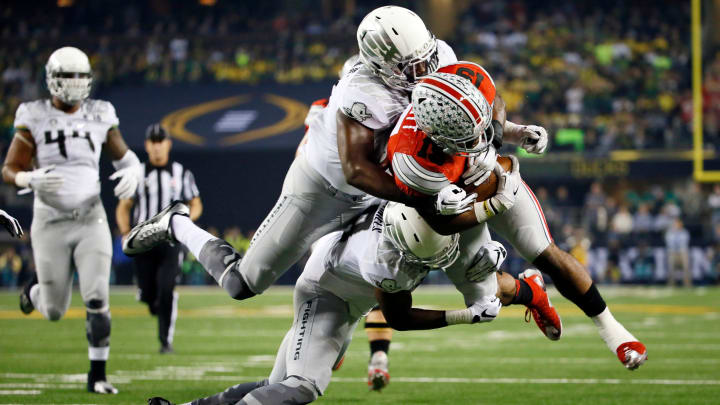Oregon Ducks Football And The Revamped College Football Playoffs

After years of questioning and second-guessing the playoff selection committee, football fans will see some dramatic changes in the 2024 playoffs.
For many years, the “playoff” was a four-team affair, often leaving some very qualified teams (think Oregon Ducks here) on the sidelines. Additionally, if we are being completely honest there seemed to have been a bias in favor of SEC and Big Ten teams. The hope now is that going from four teams to 12 will attempt to address those concerns.
One thing that has not officially changed is the composition and goal of the selection committee. These 13 individuals are tasked with selecting the best teams, ranking each team and assigning the teams to the playoff sites. Unfortunately, even with 12 teams in the mix for a national championship, there will still be some exceptionally good teams left out of the playoffs. While many have expressed an opinion that even more teams should be included, ala the NCAA basketball tournament, football just doesn’t lend itself to multiple games in a relatively short period of time.
Let’s look at which teams qualify to participate.
This all seems fairly straight forward—the five highest-ranked conference champions and the next seven highest-ranked teams will earn a spot in the 12-team bracket. Seems simple for the conference champions but not so much for the next seven.
When comparing teams for the purpose of ranking, there are several criteria the members must consider:
- Championships won
- Strength of schedule
- Head-to-head competition
- Comparative outcomes of common opponents (without incenting margin of victory)
- Other relevant factors such as unavailability of key players and coaches that might have affected a team's performance during the season or likely will affect its postseason performance
These factors are not weighted, and it is up to each individual to decide which factor is most important to them. As such, it is possible that no two rankings are going to be the same when considering each team.
One bit of good news related to the ranking process is that there is no limit as to how many teams from one conference can qualify. Perhaps surprisingly to some, the rules do not guarantee spots for certain conferences. While safe to say the champions of the Big 12, SEC, ACC and Big Ten will almost certainly routinely qualify, you cannot rule out the highest-ranked champions from the Mountain West, American Athletic Conference, Sun Belt, Mid-American Conference, or Conference USA.
Another element of this system to be considered is that there is no minimum ranking requirement for the five highest-ranked conference champions. While not likely, there could be a conference champion ranked No. 23. The rule that applies means this lowly ranked team still earns a spot in the playoffs at the expense of the committee's No. 12 team due to their championship*.
*Thinking of Oregon's back-to-back Pac-12 titles in 2019 and 2020? That 2019 team was No. 6 in the final CFP ranking and would have made the field as the fifth-highest ranked conference champion. The 2020 team, though, was ranked No. 25 at 4-2, behind conference champions from seven other leagues.
The expanded playoff field also provides for some changes in when and where games are played, especially in the early rounds. For the first time, the four highest ranked conference champions will receive the top-four seeds and a first-round bye. The other eight teams will play with the higher seeded team having the advantage of a home game (or other site as designated by the higher seed). In the past, playoff games were played at neutral sites. Suffice to say this opens the committee to criticism based on the matchups and locations.
We should also note that any team without a bye will have to win four straight games to win the national championship. It is also possible that a team who lost in the conference championship game would play an unprecedented 17 game season.
Another playoff situation of note that impacts independent teams like Notre Dame states that the Fighting Irish cannot earn a first-round bye because they do not play for a conference championship. Also, Oregon State and Washington State find themselves in the same predicament, albeit for different circumstances. Both schools have a temporary scheduling arrangement with the Mountain West Conference (MWC) that states they can compete for a national championship, but they are not eligible to win the MWC.
As to the Oregon Ducks approach to this revamped playoff system, coach Dan Lanning is confident in his team’s ability to be part of this expanded playoff.
"I'd say it's an expectation," Lanning said. "I don't know any of it means anything until we accomplish what we want to accomplish. There is one overarching goal.”
Given that this is the first year of the new format, there could be some surprises, but none that leaves the Ducks on the sideline looking in.
